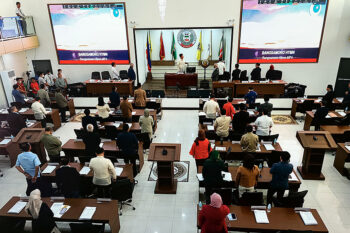
MATALAM, North Cotabato (MindaNews / 11 January) – As of this posting more than 500 senior officers of the Philippine National Police responded to the call of Secretary Benjamin Abalos of the Department of the Interior and Local Government (DILG) to file courtesy resignations. According to Abalos this was thought of as the shortest cut to cleanse the PNP of so-called “ninja cops” or rogue policemen who are either acting as protectors of the illegal drug trade or directly involved in the sale of the outlawed drugs.
Why is this being done? To get rid of “scalawags in uniform” which, according to Abalos, has been plaguing the police organization for quite a time. When asked by newsmen if those suspected of involvement in the illegal drug transactions are known, the DILG Chief answered in the affirmative. He admitted further that there are slightly more than 10 high ranking PNP officers who are suspected to be involved. Most of them are acting as “protectors” of the illegal drug business.
If they are in fact known, why can’t investigation and subsequent filing of charges be specifically focused on these PNP officers? Abalos says that with the painstakingly slow grind of justice in the country such move may not produce immediate result. Add to that the presumption of innocence of the accused until proven guilty beyond reasonable doubt plus other legal remedies available to the accused. The whole process can take years which may only ultimately redound to acquittal due to “technicalities,” according to Abalos.
Does it augur well that no less than the DILG Chief cannot seem to trust our judicial system? It leaves a bad taste in the mouth, to say the least.
Requiring all senior officers of the PNP, from the rank of colonel to general, to file courtesy resignations is rather a very drastic move. It has placed the entire police organization in bad light. It is like burning the whole house to get rid of the termites.
Even with this move, quite a number of skeptics have come up to the fore and express doubts over the effectiveness of this approach in cleansing the hierarchy of the Philippine National Police. Whether you look at it one way or the other, this is tantamount to wholesale accusation of high ranking officials of the PNP.
What about junior officers and the rank-and-file policemen, who, we can safely assume as many times more in number than the high-ranking officers who are likewise involved in the illegal drug business? How is the good Secretary thinking of getting rid of them? Are they next? Or, is it assumed that when the senior officers are out those rogue policemen down there will just stop?
Abalos admitted that the lure of “drug money” is very tempting and, more often, irresistible. We see a seemingly confused DILG Secretary who is bent on trying a drastic formula to cleanse the PNP, and yet, on the other hand admits that “drug money” is the real game changer here.
How does this work? A “committee of five” shall be created to review/assess the status of every resigned PNP Officer and submit recommendations to the President through the DILG Secretary. This will be followed by lifestyle checks on those who have heeded the call for courtesy resignations, according to PNP Chief Azurin. The President shall then act to accept or reject the “courtesy resignations” as the case may be.
As to what happens to those whose resignations are accepted by the President, the DILG Chief was not clear on this. We only know that the consequence of those whose resignations are accepted will cease to perform their duties and be separated outright from the police organization.
The normal thing that would follow is a full investigation of those whose resignations were accepted by the President. What will they do with those criminally indictable? Or those whose evidence of guilt is strong? Abalos will have no choice but to file charges in court which he was avoiding from the beginning.
What will “courtesy resignations” achieve if the courts are the last and final destination of all of these? Well, the immediate separation from the service of those whose resignations are accepted is ascertained through this process. Can’t the DILG restrict the movement of the more than 10 suspected high-ranking officers while they are on active duty? Of course it can through administrative proceedings and other preventive measures.
What else will “courtesy resignation” achieve? It may still entitle the “gang of more than 10” of their separation benefits if they are not dishonorably discharged from the service.
Funny, isn’t it?
Until then, we keep our fingers crossed.
(MindaViews is the opinion section of MindaNews. Maugan P. Mosaid holds a doctorate degree in rural development. He is a planning consultant and teaches Statistics and Methods of Research in the graduate school. He can be contacted at mauganmosaid6@gmail.com.)







